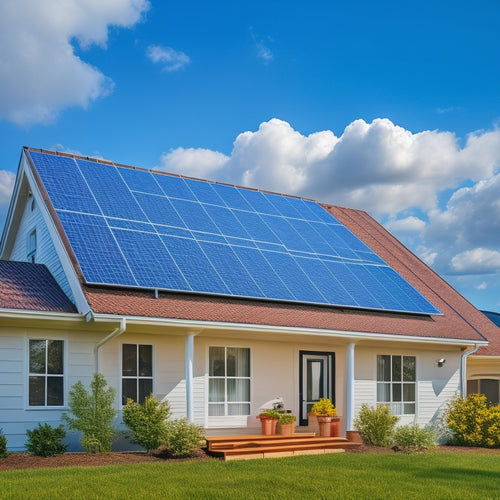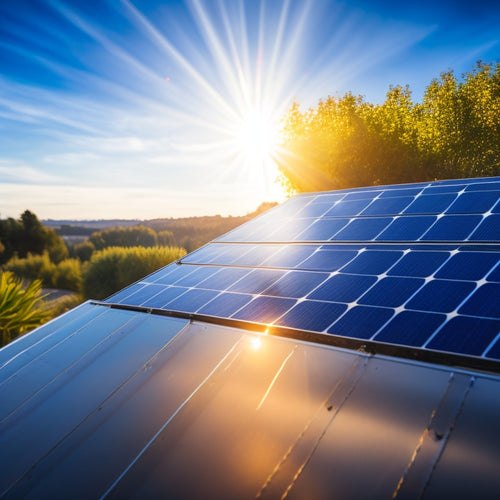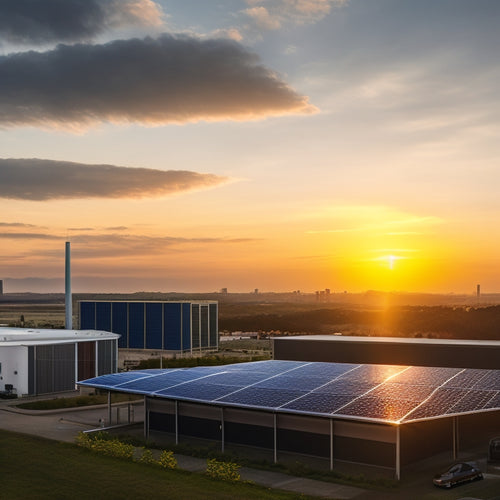
Clean Drinking Water With Energy Independence Systems
Share
You can access clean drinking water anywhere, anytime, without relying on the grid, by integrating energy independence systems with solar-powered water purification technologies. These systems utilize sunlight to power UV treatment, filtration, and distillation processes, reducing reliance on non-renewable energy sources and operational costs. Rainwater harvesting and advanced filtration technologies provide a reliable water supply, while energy storage and backup systems offer consistent access during low sunlight periods. As you investigate these innovative solutions, you'll uncover how to create a self-sufficient system that assures clean drinking water and energy independence, wherever you are.
Key Takeaways
- Solar-powered purification systems provide reliable clean drinking water, reducing reliance on non-renewable energy sources and operational costs.
- Renewable energy sources, like solar power, enhance water independence by creating self-sufficient systems that conserve water and energy.
- Photovoltaic panels generate electricity for UV purifiers and filters, ensuring consistent clean drinking water supply even in off-grid areas.
- Energy storage and backup systems guarantee clean drinking water during low sunlight periods, making solar energy a breakthrough for off-grid areas.
- Rainwater harvesting combined with filtration ensures a reliable water supply, promoting water conservation and sustainable management in communities.
Harnessing Solar Power for Water
In conjunction with modern water treatment technologies, utilizing solar power for water purification offers a sustainable solution for communities worldwide. You can capture the energy of the sun to purify water, reducing your reliance on non-renewable energy sources.
Solar water purification systems are energy efficient, using photovoltaic panels to power UV treatment, filtration, or distillation processes. This approach not only reduces your carbon footprint but also lowers operational costs, ensuring a reliable water supply and energy independence for rural communities.
Significant reductions in operational and maintenance costs enhance cost savings, making it a viable option for communities. With solar power, you can enjoy a consistent supply of clean drinking water while minimizing your impact on the environment.
Purification Systems for Remote Areas
As remote areas often lack access to reliable clean water sources, you're likely to encounter unique challenges when implementing a purification system. One effective approach is rainwater harvesting, which involves collecting and storing rainwater for later use. However, this water still requires treatment to make it safe for consumption.
| Purification Method | Advantages | Disadvantages |
|---|---|---|
| Ultraviolet (UV) Light | Effective against bacteria and viruses, low maintenance | Limited effectiveness against turbidity and particulate matter |
| Ceramic Filtration | Porous structure removes particulate matter, bacteria, and viruses | Requires regular cleaning and maintenance |
| Chemical Disinfection | Effective against a wide range of contaminants, low cost | May produce byproducts, requires careful handling |
| Reverse Osmosis | High removal efficiency for dissolved solids, bacteria, and viruses | High energy consumption, requires regular membrane replacement |
Off-Grid Water Treatment Solutions
Two primary off-grid water treatment solutions have emerged as effective alternatives for remote areas: solar-powered purification systems and portable water treatment units.
You can utilize rainwater harvesting and filtration technologies to guarantee a reliable supply of clean drinking water. Additionally, it's important to evaluate the energy source for your off-grid water pumping needs, such as solar power options that are suitable for small-scale irrigation and off-grid applications.
Furthermore, analyzing pump efficiency, focusing on flow rate, pressure, and power consumption, is vital for peak operation.
Solar-powered purification systems use energy from the sun to power UV, reverse osmosis, or ceramic filtration, making them ideal for areas with abundant sunlight.
Portable water treatment units, on the other hand, are compact and lightweight, allowing you to treat water on the go. They often employ advanced filtration technologies, such as activated carbon or microfiltration, to remove impurities and contaminants.
Solar Energy for Clean Drinking
Utilizing solar energy for clean drinking water is a breakthrough for off-grid locations. You can tap into the power of the sun to purify water, making it safe for consumption.
Solar technology offers a reliable and sustainable solution for accessing clean resources. By designing energy storage and backup systems off-grid solar power, you can guarantee a consistent supply of clean drinking water even during periods of low sunlight or outages.
Solar-powered water treatment systems use photovoltaic panels to generate electricity, which powers UV purifiers, filters, or other treatment methods. This setup guarantees a consistent supply of clean drinking water, even in areas with limited grid connectivity.
Water Independence With Renewable Energy
Achieve water independence by utilizing the power of renewable energy, an essential step towards a sustainable future. You can reduce your reliance on public water supplies and create a self-sufficient water system.
By combining renewable energy with water management systems, you'll have a consistent and reliable source of clean drinking water.
Some ways to achieve water independence with renewable energy include:
- Implementing rainwater harvesting systems to collect and store rainwater for non-potable uses
- Investing in community initiatives that focus on water conservation and sustainable management practices
- Utilizing renewable energy sources like solar or wind power to operate water treatment and distribution systems
- Incorporating water-efficient appliances and fixtures into your daily life to reduce overall water consumption
Frequently Asked Questions
Can Energy Independence Systems Be Installed in Urban Areas?
You can install energy independence systems in urban areas, leveraging existing infrastructure for efficient urban installation, which, in turn, enhances water accessibility by powering water treatment and distribution systems, providing a reliable source of clean drinking water.
How Do I Maintain My Off-Grid Water Treatment System?
You'll guarantee ideal water quality by regularly checking your off-grid water treatment system's filters, UV lamps, and membranes, and following maintenance tips like descaling, cleaning, and replacing components as needed to prevent contamination and system failure.
Are There Any Government Incentives for Renewable Energy Systems?
You'll find various government incentives for renewable energy systems, including tax credits, renewable grants, energy rebates, and funding programs, such as federal incentives, which can greatly reduce your upfront costs and increase your return on investment.
Can I Use Wind Energy Instead of Solar for My System?
You can opt for wind energy instead of solar, leveraging wind energy benefits like lower visual impact and potentially higher capacity factors, but consider the intricacies of wind turbine installation, requiring larger upfront investments.
How Long Do Energy Independence Systems Typically Last?
You're wondering how long your energy independence system will last - the answer hangs in the balance. Typically, a well-maintained system can last 20-30 years, but it's essential you follow maintenance tips to guarantee ideal system longevity.
Related Posts
-

Cost of Solar Panel Installation
You can expect to pay between $15,000 and $30,000 or more for a typical solar panel installation, depending on the sy...
-

How Efficient Are Thin Film Solar Cells
Thin film solar cells provide an innovative approach to energy generation, boasting efficiency rates generally betwee...
-

Advantages of Commercial Solar Battery On-Site Storage
By investing in a commercial solar battery on-site storage system, you can greatly reduce your energy grid dependence...


